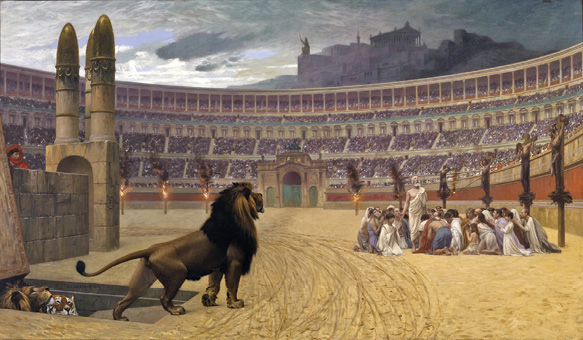“Saint Valentine” is not found in the Bible, nor is his “day.” Saint Valentine’s Day falls into the category of adiaphora—things neither commanded nor forbidden in Scripture. Let’s look at the big picture.
Saints, according to Scripture, are not extra-good believers who have died, gone to heaven, and there have special “pull” with God. The Bible does not tell us to pray to saints or worship them. Actually, every believer is a saint, one in whom the Holy Spirit, through Scripture’s message of salvation in Christ, has worked faith in Jesus. The word saint (Latin sanctus) means one who is “holy,” “set apart,” “sanctified”—or “saint”-ified!—before God. All believers, whether dead or alive, are saints—cleansed in the blood of Jesus. Paul wrote to the living believers, “saints who are in Ephesus.” (Ephesians 1:1) He also spoke of the believers in heaven and their inheritance, “inheritance of the saints in the light.” (Colossians 1:12) We do remember the believers in heaven who lived and served strong in the Lord—Saint Matthew, Saint John, Saint Paul, and so forth—but ascribe no special “powers” to them.
The name “Valentine” was a rather common surname, or last name, in the Roman Empire at the time of early Christianity (A.D. 100’s—300’s). The name means “valiant one.” We today still know names such as Rudi Valentino and Bobby V (Valentine). Records indicate that there were apparently two church leaders in the A.D.100’s with the name Valentine. Both would later be given the special Roman Catholic status of “Saints.” February 14, the day on which one of them was martyred, was designated as Saint Valentine’s Day. We do not celebrate saints’ days—whether Saint Francis, Saint Christopher, Saint Anne, Saint Valentine, or others—in the same way that the Roman Church does.

Saint Valentine is said to have ministered to the faithful amidst the persecution of Christians in the Roman Empire
It is difficult to make a clear connection between either of the early Valentines (or any other Valentine, for that matter) and the modern idea of Valentine-sweethearts. The claim may be correct that the English poet Chaucer’s words (A.D.1300’s), written regarding birds finding mates on Saint Valentine’s Day, lies at the root of the idea.
The question is, what can or should we make of February 14? It is definitely not a Biblical or a Lutheran church holiday. And neither are Mother’s Day or Father’s Day for that matter, yet we often highlight a church service around them (some may not). Perhaps “Valentine’s Day” seems a little too “worldly” for that. Yet even Easter and Christmas are corrupted with many worldly ideas that are neither helpful nor godly. If celebrating Valentine’s Day means a day to let go of or to corrupt Gods’ will for marriage, then it is wrong! Can we categorically say it’s a bad idea for a Christian to celebrate a day to honor one’s sweetheart? No. Unless it means that for the other three hundred sixty-four days of the year, the deal is off and “I” come first. Hypocrisy! The idea of Valentine’s Day is regularly adjusted to include love within the home and family. It also becomes a day for school children to express friendship with all their classmates. No fault there.
Christians sometimes draw the Lord’s love into Valentine’s Day. What about that? I can’t say it’s bad, but I definitely hear the caution not to trivialize the love of God by comparing it to sweetheart love. A similar example would be turning Christmas into merely a “birthday party” for Jesus. The Lord’s love and salvation are so much bigger than that!
Celebrating Valentine’s Day—(Saint) Valentine’s Day—is an adiaphoron. It is not a “must.” Christian freedom and Christian good sense are necessary. Whether it’s anniversaries, or birthdays, or Valentine’s Days, such days reflect blessings from God, Who with His immeasurable, forgiving love in Christ cares for us in every aspect of life.

is pastor of Saint Luke’s Lutheran Church in Lemmon, South Dakota.

